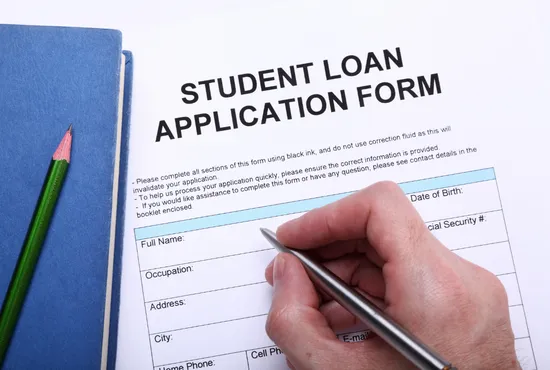
The start of the academic year - an increase of student loan fraud
Students are a paradise for scammers - young people who do not have a regular income and need money for university and life are an easy target for thieves. Worryingly, these scams continue to increase. The only way is to be aware of their existence and not to be influenced. In this article, you will find out what the most common student loan scams are, how to spot them and where to report them.
The most common student loan scams

There are a number of different ways in which student loan fraud can take place. One common method is for criminals to set up fake websites or email accounts that look like they are associated with the government or with legitimate lenders. They then use these platforms to trick people into providing personal and financial information, which can be used to steal their identity or to apply for loans in their name.
It's no secret that the cost of college has skyrocketed in recent years, leaving many students struggling to pay their tuition bills. But what happens when those same students can't even afford to repay their loans?
Another way that fraudsters target students is by offering fake promises of help with repayment or consolidation of their loans. In some cases, these offers may even come from legitimate companies that are not affiliated with the government. However, the goal is always the same – to get people to provide personal and financial information so that they can be scammed.
Unfortunately, student loan fraud is becoming all too common, as desperate borrowers turn to unscrupulous lenders for help. These lenders often charge sky-high interest rates and fees, leaving borrowers deeper in debt than ever before.
What's even worse, these lenders frequently target low-income and minority students, who are more likely to default on their loans. This predatory lending practices disproportionately harms those who can least afford it, trapping them in a cycle of debt that can be impossible to escape.
Also, some people may apply for a loan and then not use it for its intended purpose. Others may provide false information in order to receive a larger loan than they are entitled to.
What communication channels do fraudsters choose?

Scammers operate in virtually every conceivable place, but in the case of the student loan scam, more activity has been observed in:
- Social media - this applies to all platforms, but we will take as an example, the situation of the Manchester student, who lost more than £2,500. She was cought on Snapchat by a person claiming to be an employee of the Student Finance England, saying that she can get more credit after paying the fee. When the student agreed to this, instead of a transfer for the promised amount, £2,700 was taken from her account.
- E-mail - students across the country are receiving phishing scam emails claiming to be from a student loan company. In these, the scammers tell you that you can get a loan and all the information is available via a link in the email. Of course, the link, as well as the entire email, is fake and their only aim is to redirect you to a fake website and trick you into providing personal details, bank details or extorting payment.
- Text messages - Action Fraud warns of text messages sent to students. Their content may look something like this: "Dear student, your maintenance loan is ready to be confirmed. Please visit (link)". Of course, never do that and always treat it as potentially dangerous link. If you are waiting for any decision, always check the information, but only using official communication channels.
- Phone calls - is probably the least popular form of cheating among students, but one that still takes place. Be aware of fraudulent phone calls from people claiming to be officials or employees of Student Loans Company.
How to spot student loan scam?

It's unfortunately become a part of our lives that we have to be aware of constantly evolving digital scams, phishing and identity theft. However, during the three student finance payment periods in September, January and April, scammers are more likely to try to take advantage of students.
1. The fraudulent emails that mimic real companies or organizations usually have several spelling, grammar, design, and image quality errors.
2. If a company only has your email address and not your name, the automated message will typically start with something like "To our valued customer" or "Dear..." followed by your email address.
3. Both businesses and organizations avoid web-based addresses from providers like Gmail, Hotmail or Yahoo. Instead, they use domain names that are usually short and to the point.
4. Never share your personal information, bank account number, current or previous addresses.
5. Do not send your ID or passport information.
6. Never trust people who find you somewhere and contact you themselves.
7. Never click on any links provided in the emails or text messages.
8. Think about what you share on social media - this is where scammers mainly get their information, which they then use when communicating with you.
Where to report this scam?

Take Five to stop fraud is national campaign aimed at stopping fraud:
STOP - take a moment to stop and think before doing anything.
CHALLENGE - it’s ok to reject, refuse or ignore any requests. Only criminals will try to rush or panic you.
PROTECT - contact your bank immediately if you think you’ve fallen for a scam and report it to Action Fraud, which is the UK’s national fraud and cybercrime reporting centre. Remember to use only official phone numbers.
You should also report this scam to Student Loans Company (SLC). They have a duty to make sure that public funds are used and protected properly, and it is committed to preventing fraud. The company recognizes that being open and accountable are key in order to prevent fraud occurrences as well as responding quickly if/when it is discovered.
If you suspect fraud you can complete REPORT A FRAUD CONCERN Form and send it to Customer Compliance, Student Loans Company Ltd, 100 Bothwell Street, Glasgow G2 7JD or email to [email protected] You can download the Form at www.Gov.UK/SLC. You can also call them on 0300 100 0059 or send an email to [email protected].
To get rid of the problem the UK government has proposed a number of measures to crack down on it. These include introducing tougher eligibility criteria for loans, increasing the amount of information that borrowers must provide, and improving data sharing between agencies.
Despite these efforts, student loan fraud is still a major issue in the UK. If you're thinking about taking out a loan to pay for your education, make sure you understand the risks involved. And if you're already struggling to repay your loan, there are options available to help you get back on track.